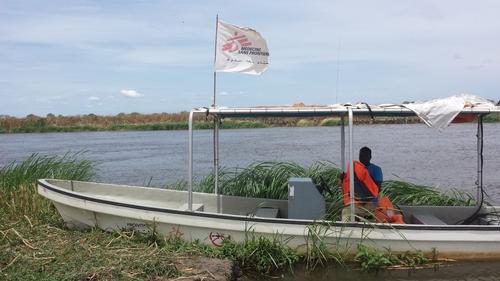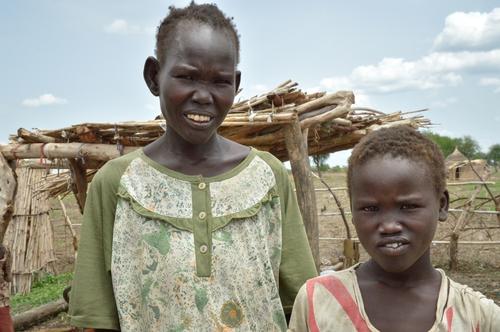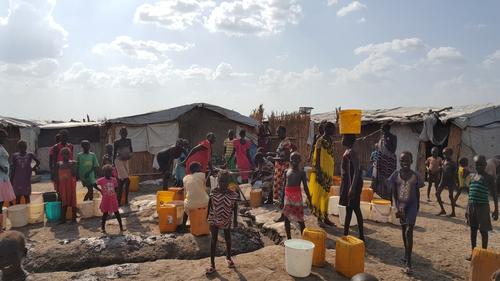Little Wuk is a malnourished boy. He is two years old but only weighs as much as a few-month-old baby. He was admitted three days ago and received stabilisation treatment with low caloric milk and antibiotics to treat infection.
This morning he has started eating ready-to-use therapeutic food. Made from a peanut paste, the therapeutic food is rich in energy, protein, fats, vitamins and minerals. If he gains weight and does not require further treatment he will be discharged in a few days and his mother, aged 29, will be able to take him home with her four other children. This was the first time she had come to the Médecins Sans Frontières (MSF) hospital from her village, and it took five hours, first walking and then by car.
Little Wuk’s story is unfortunately one of numerous examples of critical cases the medical team from MSF in Aweil State hospital receives, and they may not see the most severe cases due to the difficulties patients have to reach the hospital from far distances.
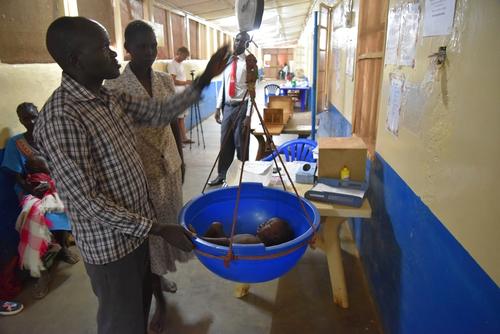
The effects of food insecurity
“In April 2016, at the end of the dry season, an average of 44 severely malnourished children were admitted every week in the paediatric department”, explains Florence Okatch, head nurse for MSF in Aweil. “The general paediatrics department has 110 beds and operates 24/7. The medical team provides intensive care, surgery, and neonatal care, and receives many patients with burns due to the precarious living conditions, not to mention fractures and other trauma.”
John is only four years old, but he’s pretty tall for his age. He was climbing a mango tree with his friends, trying to fetch the last fruit of the season, when he fell and broke both wrists. They hurt, but people in his family are stoic so he didn’t complain much. After a few days the pain was intolerable – he could hardly move his hands and his wrists were swollen.
His parents decided to bring him to the MSF hospital as they knew he would be treated well. John waits without complaint in the assessment room for the team to take care of him. John slowly moves his fingers as he and his parents answer questions from the staff. He will have an X-ray and be assessed on the need for surgery.
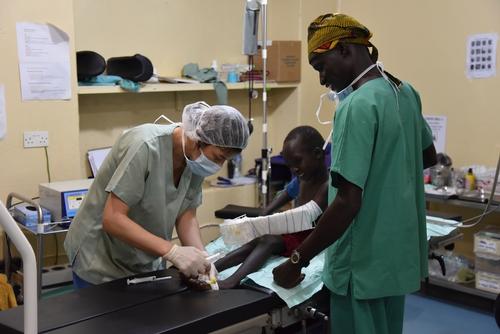
Epidemics, maternity care, and skilled health workers in short supply
The hospital also deals with epidemic emergencies. In March 2016, the MSF team responded to a measles outbreak, treating patients and organising a vaccination campaign. The campaign reached 18,460 children between 6 months old and 5 years of age.
In addition to the paediatric department, the hospital also operates a maternity service with 35 beds and provides maternity care for standard and complicated deliveries, including emergency obstetrics and gynaecology. The medical team supports an average of 110 deliveries per week.
The hospital has approximately 380 employees, with around 20 international staff, numbers which can increase to address emergencies such as the malaria peak. The shortage of trained medical personnel in South Sudan is one of many constraints to providing healthcare. WHO statistics suggest there are fewer than 200 doctors for the total South Sudanese population of 12 million. To address this challenge MSF is welcoming and training student nurses and paramedical staff from the nursing school in nearby Wau.
Access to healthcare a challenge
< Decades of war and instability in South Sudan have resulted in widespread poverty in much of the country, including Aweil. This has recently been exacerbated by several months of very high inflation. This makes day-to-day survival a challenge for many. The past two and a half years of civil war did not affect Aweil directly, but the indirect consequence has been that already scarce health services have been further reduced. In addition, the lack of healthcare overall, whether due to insufficient medical facilities, access difficulties due to the absence of transport, insufficient coverage of humanitarian and medical aid, or the recent crippling shortages of essential drugs in medical structures drastically limits peoples’ access to healthcare. These factors represent major challenges to overcome for the population and MSF teams.
“The presence of MSF’s maternity and paediatric department in Aweil hospital is an essential life-saving service for the population,” explains Florence Okatch.
Since 2008, in the north of South Sudan, MSF has been running the paediatric and maternity departments in the Ministry of Health hospital (Aweil State Hospital) in Aweil. It is the only hospital for a population of more than 100,000 in Aweil town and over 1 million people in the whole state. The capacity of 145 beds during dry season can increase to more than 225 during rainy season to absorb the increased caseload of children suffering from malaria.



